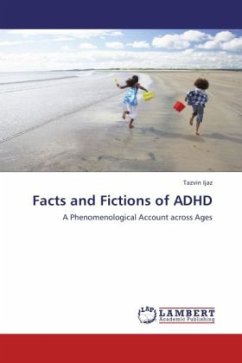- Broschiertes Buch
- Merkliste
- Auf die Merkliste
- Bewerten Bewerten
- Teilen
- Produkt teilen
- Produkterinnerung
- Produkterinnerung
Written in a lively and entertaining style, Facts and Fictions in Mental Health examines common conceptions and misconceptions surrounding mental health and its treatment. Each chapter focuses on a misconception and is followed by a discussion of related findings from scientific research. _ A compilation of the authors' "Facts and Fictions" columns written for Scientific American Mind, with the addition of six new columns exclusive to this book _ Written in a lively and often entertaining style, accessible to both the undergraduate and the interested general reader _ Each chapter covers a…mehr
Andere Kunden interessierten sich auch für
![Facts and Fictions of ADHD Facts and Fictions of ADHD]() Tazvin IjazFacts and Fictions of ADHD32,99 €
Tazvin IjazFacts and Fictions of ADHD32,99 €![Facts and Models in Hearing Facts and Models in Hearing]() Facts and Models in Hearing83,99 €
Facts and Models in Hearing83,99 €![Intellectual Disability Facts Intellectual Disability Facts]() Monica ZamanIntellectual Disability Facts51,99 €
Monica ZamanIntellectual Disability Facts51,99 €![Mindfulness - A Kindly Approach to Being withCancer Mindfulness - A Kindly Approach to Being withCancer]() Trish BartleyMindfulness - A Kindly Approach to Being withCancer23,99 €
Trish BartleyMindfulness - A Kindly Approach to Being withCancer23,99 €![Clinical Psychology Clinical Psychology]() Clinical Psychology56,99 €
Clinical Psychology56,99 €![The International Handbook of Suicide Prevention The International Handbook of Suicide Prevention]() The International Handbook of Suicide Prevention168,99 €
The International Handbook of Suicide Prevention168,99 €![The Wiley Handbook of Positive Clinical Psychology The Wiley Handbook of Positive Clinical Psychology]() The Wiley Handbook of Positive Clinical Psychology238,99 €
The Wiley Handbook of Positive Clinical Psychology238,99 €-
-
-
Written in a lively and entertaining style, Facts and Fictions in Mental Health examines common conceptions and misconceptions surrounding mental health and its treatment. Each chapter focuses on a misconception and is followed by a discussion of related findings from scientific research.
_ A compilation of the authors' "Facts and Fictions" columns written for Scientific American Mind, with the addition of six new columns exclusive to this book
_ Written in a lively and often entertaining style, accessible to both the undergraduate and the interested general reader
_ Each chapter covers a different "fiction" and allows readers to gain a more balanced and accurate view of important topics in mental health
_ The six new columns examine myths and misconceptions of considerable interest and relevance to undergraduates in abnormal psychology courses
_ Introductory material and references are included throughout the book
Hinweis: Dieser Artikel kann nur an eine deutsche Lieferadresse ausgeliefert werden.
_ A compilation of the authors' "Facts and Fictions" columns written for Scientific American Mind, with the addition of six new columns exclusive to this book
_ Written in a lively and often entertaining style, accessible to both the undergraduate and the interested general reader
_ Each chapter covers a different "fiction" and allows readers to gain a more balanced and accurate view of important topics in mental health
_ The six new columns examine myths and misconceptions of considerable interest and relevance to undergraduates in abnormal psychology courses
_ Introductory material and references are included throughout the book
Hinweis: Dieser Artikel kann nur an eine deutsche Lieferadresse ausgeliefert werden.
Produktdetails
- Produktdetails
- Verlag: Wiley & Sons / Wiley-Blackwell
- Artikelnr. des Verlages: 1A118311290
- 1. Auflage
- Seitenzahl: 288
- Erscheinungstermin: 17. April 2017
- Englisch
- Abmessung: 216mm x 139mm x 17mm
- Gewicht: 322g
- ISBN-13: 9781118311295
- ISBN-10: 1118311299
- Artikelnr.: 37706000
- Herstellerkennzeichnung
- Produktsicherheitsverantwortliche/r
- Europaallee 1
- 36244 Bad Hersfeld
- gpsr@libri.de
- Verlag: Wiley & Sons / Wiley-Blackwell
- Artikelnr. des Verlages: 1A118311290
- 1. Auflage
- Seitenzahl: 288
- Erscheinungstermin: 17. April 2017
- Englisch
- Abmessung: 216mm x 139mm x 17mm
- Gewicht: 322g
- ISBN-13: 9781118311295
- ISBN-10: 1118311299
- Artikelnr.: 37706000
- Herstellerkennzeichnung
- Produktsicherheitsverantwortliche/r
- Europaallee 1
- 36244 Bad Hersfeld
- gpsr@libri.de
Hal Arkowitz is Associate Professor of Psychology at the University of Arizona. He has published widely in the areas of anxiety, depression, resistance to change, and psychotherapy. A past editor of the Journal of Psychotherapy Integration, he maintains an active clinical practice as well as teaching courses on abnormal psychology, psychopathology, and psychotherapy at both the undergraduate and graduate levels. Scott O. Lilienfeld is Professor of Psychology at Emory University in Atlanta. Dr. Lilienfeld has published over 200 articles, book chapters, and books on personality, personality assessment, anxiety disorders, psychiatric classification and diagnosis, pseudoscience in psychology, and evidence-based practices in clinical psychology. In addition, he has appeared on ABC's 20/20, CNN, the CBS Evening News, and National Public Radio.
Notes on Authors xi
Preface xiii
Acknowledgments xvii
Section 1 Anxiety?-Related Disorders 1
Introduction 1
1 Why Do We Panic? 5
2 Does Posttraumatic Stress Disorder Require Trauma? 9
3 Clutter, Clutter, Everywhere: The Problem of Hoarding 14
4 Eye Movement Desensitization and Reprocessing (EMDR) for Anxiety: Taking a Closer Look 18
5 The Down Sides of Anti?-Anxiety Medication 22
6 Is Mindfulness Good Medicine for Anxiety and Depression? 26
7 Can Herbs Ease Anxiety and Depression? 30
Section 2 Mood Disorders 35
Introduction 35
8 Bipolar Disorders and Creativity: Psychological Truth or Urban Legend? 37
9 Grief Without Tears? 42
10 Is Depression Just Bad Chemistry? 46
11 Four Myths About Suicide 51
12 What Is the Best Treatment for Depression: Drugs, Psychotherapy, or Both? 55
13 Can Antidepressants Cause Suicide? 63
14 The Truth About Shock Therapy 70
Section 3 Child and Adolescent Disorders 75
Introduction 75
15 Are Doctors Diagnosing Too Many Children With ADHD? 79
16 Autism: An Epidemic? 83
17 What Do We Know About Tourette's Disorder? 88
18 Do Children Get Bipolar Disorder? 93
19 Kid Gloves for Young Offenders? 97
20 Is Divorce Bad for Children? 101
Section 4 Addictions 105
Introduction 105
21 The Truth About Pot 107
22 Does Alcoholics Anonymous Work? 112
23 Self?-Help for Addictions 117
24 How Destructive Is Internet Porn? 121
25 Just Say No? 125
Section 5 Externalizing Problems 129
Introduction 129
26 Road Rage: What Is It and What Can We Do About It? 131
27 Once a Sex Offender, Always a Sex Offender: Maybe Not 135
28 Are Men the More Belligerent Sex? 139
Section 6 Personality Disorders 143
Introduction 143
29 A Dose of Narcissism can be Useful 147
30 The Truth About Borderline Personality 151
31 What "Psychopath" Means 155
Section 7 Shattered Selves: Schizophrenia and Dissociative Identity Disorder 159
Introduction 159
32 Can People Have Multiple Personalities? 161
33 How Violent are People with Mental Illness? 166
34 Can People with Schizophrenia be Helped? 170
Section 8 Popular Myths About the Brain and Behavior 175
Introduction 175
35 Uncovering "Brainscams" 177
36 Is Hypnosis a Distinct Form of Consciousness? 181
37 Memory in Old Age: Not a Lost Cause 185
Section 9 Psychotherapy and Other Approaches to Change 189
Introduction 189
38 Are all Psychotherapies Created Equal? 193
39 Do Self?-Help Books Help? 197
40 The "Just Do It!" Trap: Why Dr. Phil and Dr. Laura Won't Solve Your Problems 201
41 Can Animals Aid Therapy? 205
42 Psychotherapy in the Public Eye 210
43 Why Don't People Change? 215
Section 10 Other Myths 219
Introduction 219
44 Do Psychological Disorders Differ Across Cultures? 221
45 Can Positive Thinking Be Negative? 226
46 Does a Full Moon Really Trigger Strange Behavior? 230
47 Do the Eyes Have It? Eyewitness Testimony Is Often Inaccurate 235
48 The Insanity Defense on Trial 239
49 How Much Does the Environment Contribute to Obesity? 243
50 When Eating Becomes an Illness 247
51 Self?-Harm: The Cutting Edge 251
Postscript: A Reader's Guide to Baloney Detection 2
Preface xiii
Acknowledgments xvii
Section 1 Anxiety?-Related Disorders 1
Introduction 1
1 Why Do We Panic? 5
2 Does Posttraumatic Stress Disorder Require Trauma? 9
3 Clutter, Clutter, Everywhere: The Problem of Hoarding 14
4 Eye Movement Desensitization and Reprocessing (EMDR) for Anxiety: Taking a Closer Look 18
5 The Down Sides of Anti?-Anxiety Medication 22
6 Is Mindfulness Good Medicine for Anxiety and Depression? 26
7 Can Herbs Ease Anxiety and Depression? 30
Section 2 Mood Disorders 35
Introduction 35
8 Bipolar Disorders and Creativity: Psychological Truth or Urban Legend? 37
9 Grief Without Tears? 42
10 Is Depression Just Bad Chemistry? 46
11 Four Myths About Suicide 51
12 What Is the Best Treatment for Depression: Drugs, Psychotherapy, or Both? 55
13 Can Antidepressants Cause Suicide? 63
14 The Truth About Shock Therapy 70
Section 3 Child and Adolescent Disorders 75
Introduction 75
15 Are Doctors Diagnosing Too Many Children With ADHD? 79
16 Autism: An Epidemic? 83
17 What Do We Know About Tourette's Disorder? 88
18 Do Children Get Bipolar Disorder? 93
19 Kid Gloves for Young Offenders? 97
20 Is Divorce Bad for Children? 101
Section 4 Addictions 105
Introduction 105
21 The Truth About Pot 107
22 Does Alcoholics Anonymous Work? 112
23 Self?-Help for Addictions 117
24 How Destructive Is Internet Porn? 121
25 Just Say No? 125
Section 5 Externalizing Problems 129
Introduction 129
26 Road Rage: What Is It and What Can We Do About It? 131
27 Once a Sex Offender, Always a Sex Offender: Maybe Not 135
28 Are Men the More Belligerent Sex? 139
Section 6 Personality Disorders 143
Introduction 143
29 A Dose of Narcissism can be Useful 147
30 The Truth About Borderline Personality 151
31 What "Psychopath" Means 155
Section 7 Shattered Selves: Schizophrenia and Dissociative Identity Disorder 159
Introduction 159
32 Can People Have Multiple Personalities? 161
33 How Violent are People with Mental Illness? 166
34 Can People with Schizophrenia be Helped? 170
Section 8 Popular Myths About the Brain and Behavior 175
Introduction 175
35 Uncovering "Brainscams" 177
36 Is Hypnosis a Distinct Form of Consciousness? 181
37 Memory in Old Age: Not a Lost Cause 185
Section 9 Psychotherapy and Other Approaches to Change 189
Introduction 189
38 Are all Psychotherapies Created Equal? 193
39 Do Self?-Help Books Help? 197
40 The "Just Do It!" Trap: Why Dr. Phil and Dr. Laura Won't Solve Your Problems 201
41 Can Animals Aid Therapy? 205
42 Psychotherapy in the Public Eye 210
43 Why Don't People Change? 215
Section 10 Other Myths 219
Introduction 219
44 Do Psychological Disorders Differ Across Cultures? 221
45 Can Positive Thinking Be Negative? 226
46 Does a Full Moon Really Trigger Strange Behavior? 230
47 Do the Eyes Have It? Eyewitness Testimony Is Often Inaccurate 235
48 The Insanity Defense on Trial 239
49 How Much Does the Environment Contribute to Obesity? 243
50 When Eating Becomes an Illness 247
51 Self?-Harm: The Cutting Edge 251
Postscript: A Reader's Guide to Baloney Detection 2
Notes on Authors xi
Preface xiii
Acknowledgments xvii
Section 1 Anxiety?-Related Disorders 1
Introduction 1
1 Why Do We Panic? 5
2 Does Posttraumatic Stress Disorder Require Trauma? 9
3 Clutter, Clutter, Everywhere: The Problem of Hoarding 14
4 Eye Movement Desensitization and Reprocessing (EMDR) for Anxiety: Taking a Closer Look 18
5 The Down Sides of Anti?-Anxiety Medication 22
6 Is Mindfulness Good Medicine for Anxiety and Depression? 26
7 Can Herbs Ease Anxiety and Depression? 30
Section 2 Mood Disorders 35
Introduction 35
8 Bipolar Disorders and Creativity: Psychological Truth or Urban Legend? 37
9 Grief Without Tears? 42
10 Is Depression Just Bad Chemistry? 46
11 Four Myths About Suicide 51
12 What Is the Best Treatment for Depression: Drugs, Psychotherapy, or Both? 55
13 Can Antidepressants Cause Suicide? 63
14 The Truth About Shock Therapy 70
Section 3 Child and Adolescent Disorders 75
Introduction 75
15 Are Doctors Diagnosing Too Many Children With ADHD? 79
16 Autism: An Epidemic? 83
17 What Do We Know About Tourette's Disorder? 88
18 Do Children Get Bipolar Disorder? 93
19 Kid Gloves for Young Offenders? 97
20 Is Divorce Bad for Children? 101
Section 4 Addictions 105
Introduction 105
21 The Truth About Pot 107
22 Does Alcoholics Anonymous Work? 112
23 Self?-Help for Addictions 117
24 How Destructive Is Internet Porn? 121
25 Just Say No? 125
Section 5 Externalizing Problems 129
Introduction 129
26 Road Rage: What Is It and What Can We Do About It? 131
27 Once a Sex Offender, Always a Sex Offender: Maybe Not 135
28 Are Men the More Belligerent Sex? 139
Section 6 Personality Disorders 143
Introduction 143
29 A Dose of Narcissism can be Useful 147
30 The Truth About Borderline Personality 151
31 What "Psychopath" Means 155
Section 7 Shattered Selves: Schizophrenia and Dissociative Identity Disorder 159
Introduction 159
32 Can People Have Multiple Personalities? 161
33 How Violent are People with Mental Illness? 166
34 Can People with Schizophrenia be Helped? 170
Section 8 Popular Myths About the Brain and Behavior 175
Introduction 175
35 Uncovering "Brainscams" 177
36 Is Hypnosis a Distinct Form of Consciousness? 181
37 Memory in Old Age: Not a Lost Cause 185
Section 9 Psychotherapy and Other Approaches to Change 189
Introduction 189
38 Are all Psychotherapies Created Equal? 193
39 Do Self?-Help Books Help? 197
40 The "Just Do It!" Trap: Why Dr. Phil and Dr. Laura Won't Solve Your Problems 201
41 Can Animals Aid Therapy? 205
42 Psychotherapy in the Public Eye 210
43 Why Don't People Change? 215
Section 10 Other Myths 219
Introduction 219
44 Do Psychological Disorders Differ Across Cultures? 221
45 Can Positive Thinking Be Negative? 226
46 Does a Full Moon Really Trigger Strange Behavior? 230
47 Do the Eyes Have It? Eyewitness Testimony Is Often Inaccurate 235
48 The Insanity Defense on Trial 239
49 How Much Does the Environment Contribute to Obesity? 243
50 When Eating Becomes an Illness 247
51 Self?-Harm: The Cutting Edge 251
Postscript: A Reader's Guide to Baloney Detection 2
Preface xiii
Acknowledgments xvii
Section 1 Anxiety?-Related Disorders 1
Introduction 1
1 Why Do We Panic? 5
2 Does Posttraumatic Stress Disorder Require Trauma? 9
3 Clutter, Clutter, Everywhere: The Problem of Hoarding 14
4 Eye Movement Desensitization and Reprocessing (EMDR) for Anxiety: Taking a Closer Look 18
5 The Down Sides of Anti?-Anxiety Medication 22
6 Is Mindfulness Good Medicine for Anxiety and Depression? 26
7 Can Herbs Ease Anxiety and Depression? 30
Section 2 Mood Disorders 35
Introduction 35
8 Bipolar Disorders and Creativity: Psychological Truth or Urban Legend? 37
9 Grief Without Tears? 42
10 Is Depression Just Bad Chemistry? 46
11 Four Myths About Suicide 51
12 What Is the Best Treatment for Depression: Drugs, Psychotherapy, or Both? 55
13 Can Antidepressants Cause Suicide? 63
14 The Truth About Shock Therapy 70
Section 3 Child and Adolescent Disorders 75
Introduction 75
15 Are Doctors Diagnosing Too Many Children With ADHD? 79
16 Autism: An Epidemic? 83
17 What Do We Know About Tourette's Disorder? 88
18 Do Children Get Bipolar Disorder? 93
19 Kid Gloves for Young Offenders? 97
20 Is Divorce Bad for Children? 101
Section 4 Addictions 105
Introduction 105
21 The Truth About Pot 107
22 Does Alcoholics Anonymous Work? 112
23 Self?-Help for Addictions 117
24 How Destructive Is Internet Porn? 121
25 Just Say No? 125
Section 5 Externalizing Problems 129
Introduction 129
26 Road Rage: What Is It and What Can We Do About It? 131
27 Once a Sex Offender, Always a Sex Offender: Maybe Not 135
28 Are Men the More Belligerent Sex? 139
Section 6 Personality Disorders 143
Introduction 143
29 A Dose of Narcissism can be Useful 147
30 The Truth About Borderline Personality 151
31 What "Psychopath" Means 155
Section 7 Shattered Selves: Schizophrenia and Dissociative Identity Disorder 159
Introduction 159
32 Can People Have Multiple Personalities? 161
33 How Violent are People with Mental Illness? 166
34 Can People with Schizophrenia be Helped? 170
Section 8 Popular Myths About the Brain and Behavior 175
Introduction 175
35 Uncovering "Brainscams" 177
36 Is Hypnosis a Distinct Form of Consciousness? 181
37 Memory in Old Age: Not a Lost Cause 185
Section 9 Psychotherapy and Other Approaches to Change 189
Introduction 189
38 Are all Psychotherapies Created Equal? 193
39 Do Self?-Help Books Help? 197
40 The "Just Do It!" Trap: Why Dr. Phil and Dr. Laura Won't Solve Your Problems 201
41 Can Animals Aid Therapy? 205
42 Psychotherapy in the Public Eye 210
43 Why Don't People Change? 215
Section 10 Other Myths 219
Introduction 219
44 Do Psychological Disorders Differ Across Cultures? 221
45 Can Positive Thinking Be Negative? 226
46 Does a Full Moon Really Trigger Strange Behavior? 230
47 Do the Eyes Have It? Eyewitness Testimony Is Often Inaccurate 235
48 The Insanity Defense on Trial 239
49 How Much Does the Environment Contribute to Obesity? 243
50 When Eating Becomes an Illness 247
51 Self?-Harm: The Cutting Edge 251
Postscript: A Reader's Guide to Baloney Detection 2








